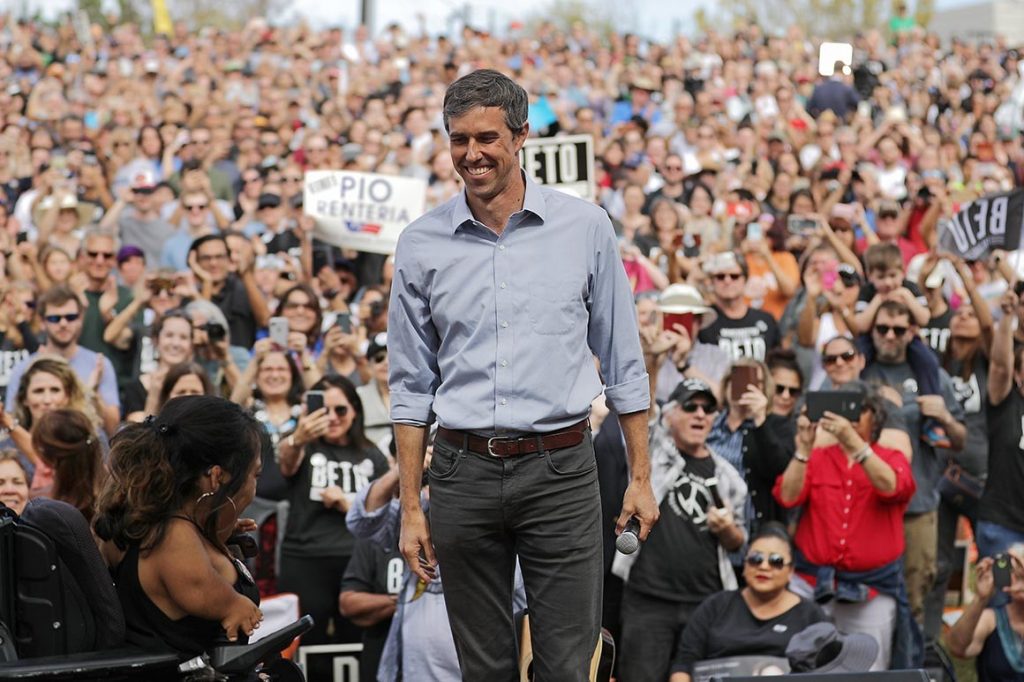(Reuters) – Beto O’Rourke, the youthful Texan who gained a national following with his long-shot election battle against U.S. Senator Ted Cruz last year, on Thursday launched a bid for the 2020 Democratic presidential nomination.
The 46-year-old O’Rourke, a former three-term U.S. congressman and a punk rocker in his youth, pledged to tackle “the interconnected crises in our economy, our democracy and our climate.”
“This moment of peril produces, perhaps, the greatest moment of promise for this country,” he said in an online video.
O’Rourke followed his announcement with a trip to Iowa, the Midwestern farm state that will hold the first Democratic nominating contest in February 2020.
Greeted by cheers at his first stop in Keokuk, Iowa, he told his audience, “It is a huge, huge honor to be here with you.”
O’Rourke outlined challenges facing the United States, from immigration to climate change, saying, “The foundational challenge to get all of this done, is to fix our democracy.”
In running for president, O’Rourke is hoping to leverage the fame he gained with his Senate race in Texas. He was an underdog when he challenged Cruz, a Republican in the mostly conservative state, but he quickly demonstrated an ability to draw capacity crowds and raise money from voters nationwide.
His long-shot bid drew widespread media attention and excited voters in a party desperate for fresh political faces. O’Rourke lost the race by less than 3 percentage points, the tightest U.S. Senate contest in the state in four decades.
Early opinion polls on the 2020 race have consistently ranked O’Rourke in the top tier of contenders, behind former Vice President Joe Biden, who has not yet announced whether he is running, and U.S. Senator Bernie Sanders of Vermont.
Since his Senate bid ended, O’Rourke has worked to keep himself in the public eye, regularly staying in touch with supporters and sitting for an interview with Oprah Winfrey.
He took a well-publicized road trip across the American Southwest, stopping at colleges and diners. He visited with students in the key swing state of Wisconsin.
In February, he held a rally in his hometown of El Paso, Texas, on the same night as one staged there by Republican President Donald Trump. Both rallies drew thousands, and put the two men’s divergent positions on the border wall on sharp display.
In El Paso, Trump ridiculed O’Rourke as “a young man who’s got very little going for himself, except he’s got a great first name.”
TESTING THE CORNFIELDS
The Iowa trip will be the first test of whether O’Rourke can take the pop-star appeal he showed in Texas last year to the national stage.
Beyond a previously announced event in Waterloo, Iowa, on Saturday, O’Rourke is expected to visit other towns in eastern Iowa, traditionally a Democratic stronghold.
Starting with the Iowa caucuses next year, the Democrat who amasses the majority of delegates nationwide in a series of contests will be nominated at the party’s convention in Milwaukee in the summer, and will likely face Trump in November’s general election.
Like progressives such as Sanders, O’Rourke premised much of his appeal in the Senate race on his refusal to accept money from political action committees and instead raised $80 million from small-dollar donors – a national record for a Senate bid. He also ran a campaign staffed by volunteers instead of political professionals.
Building a national presidential operation, however, is a different matter. O’Rourke will need those same donors to flock to him in a way that makes him competitive with other well-funded candidates, including other grassroots stars such as Sanders and Senator Elizabeth Warren of Massachusetts.
He also will have to convince some party liberals that he will promote their agenda. They have zeroed in on his refusal while in the House of Representatives to co-sponsor legislation providing “Medicare-for-all” and free college tuition, although during his Senate campaign O’Rourke promoted the idea of universal health care.
In his six years in Congress representing a region of West Texas along the border with Mexico, O’Rourke largely did not ally himself with progressives, instead joining the centrist “New Democrat” coalition.
“I’m not big on labels,” O’Rourke told reporters in December when asked whether he could be considered a progressive.
Last month, he appeared to attempt to separate himself further from that wing of the party when he pointedly called himself a capitalist. “I don’t see how we’re able to meet any of the fundamental challenges that we have as a country without, in part, harnessing the power of the market,” O’Rourke said.
Trump and his Republican allies have tried to demonize the current presidential field as socialists.
Since losing the White House in 2016, Democrats have grappled with how to best take on Trump in 2020. Some in the party believe an establishment figure who can appeal to centrist voters is the way to victory. Others argue a fresh face is needed to energize the party’s increasingly left-leaning base.
O’Rourke, whose given name is Robert Francis, acquired his nickname while growing up in El Paso. After studying at Columbia University and working briefly in New York, he returned to his hometown and started a software company.
In 2005, he was elected to El Paso’s city council. Seven years later, he ran against the incumbent Democratic congressman, Silvestre Reyes, and won, a notable feat in a Latino-majority district. He was re-elected twice.
A former bassist in a punk band, O’Rourke was arrested for driving while intoxicated in 1998. That has been an issue in every campaign he has run and will undoubtedly resurface during his presidential bid.
